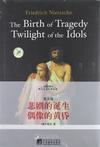悲剧的诞生.偶像的黄昏
出版时间:2012-1 出版社:中央编译出版社 作者:尼采 页数:228 字数:280000
Tag标签:无
内容概要
NIErZSCHE found in classical Athenian tragedy an art form that
transcended the pessimism and nihilism of a fundamentally
meaningless world. Nietzsche discusses the history of the tragic
form and introduces an intellectual dichotomy between the Dionysian
and the Apollonian. Nietzsche claims life always involves a
struggle between these two elements, each battling for control over
the existence of humanity.
Twilight of the Idols was written in just over a week. As
Nietzsche's fame and popularity was spreading both inside and
outside Germany, he felt that he needed a text that was a short
introduction to his work; Twilight of the Idols is his attempt at
this,
作者简介
FRIEDRICH NIETZSCHE(1844-1900) was a 19th-century German
philosopher, poet, composer and classical philologist. He wrote
critical texts on religion, morality, contemporary culture,
philosophy and science, displaying a fondness for metaphor, irony
and aphorism.
Nietzsche's influence remains substantial within and beyond
philosophy, notably in existentialism, nihilism and postmodernism.
His key ideas include the death of God, perspectives, the
Ubermensch, the eternal recurrence, and the will to power.
书籍目录
INTRODUCTION
THE BIRTH OF TRAGEDY
THE BIRTH OF TRAGEDY
TWILIGHT OF THE IDOLS
PREFACE
MAXIMS AND ARROWS
THE PROBLEM OF SOCRATES
"REASON" IN PHILOSOPHY
HOW THE "TRUE WORLD" FINALLY
BECAME A FABLE
MORALITY AS ANTI-NATURE
THE FOUR GREAT ERRORS
THE "IMPROVERS" OF MANKIND
WHAT THE GERMANS LACK
SKIRMISHES OF AN UNTIMELY MAN
WHAT I OWE TO THE ANCIENTS
THE HAMMER SPEAKS
章节摘录
版权页: Nietzsche’s work addresses ethics from several perspectives:meta-ethics,normative ethics,and descriptive ethics. In the field of meta-ethics,one can perhaps most accurately classify Nietzsche as a moral skeptic; meaning that he claims that all ethical statements are false,because any kind of correspondence between ethical statements and“moral facts”remains illusory.(This forms part of a more general claim that no universally true fact exists,roughly because none of them more than“appear”to correspond to reality).Instead,ethical statements(like all statements)remain mere“interpretations.”However,Nietzsche does not claim that all interpretations are equivalent,since some testify for“noble”character while others are the symptom of a“decadent”life form. Sometimes Nietzsche may seem to have very definite opinions on what he regards as moral or as immoral.Note,however,that one can explain Nietzsche’s moral opinions without attributing to him the claim of their truth.For Nietzsche,after all,we needn’t disregard a statement merely because it expresses something false.On the contrary,he depicts falsehood as essential for“life”.Interestingly enough,he mentions a“dishonest lie”,(discussing Wagner in The Case ofWagner)as opposed to an“honest”one,recommending further to consult Plato with regard to the latter,which should give some idea of the layers of paradox in his work. In the juncture between normative ethics and descriptive ethics,Nietzsche distinguishes between“master morality”and“slave morality”.Although he recognizes that not everyone holds either scheme in a clearly delineated fashion without some syncretism,he presents them in contrast to one another. Nietzsche elaborated these ideas in his book On the Genealogy of Morality,in which he also introduced the key concept of ressentiment as the basis for the slave morality.Nietzsche’s primarily negative assessment of the ethical and moralistic teachings of the world’s monotheistic religions followed from his earlier considerations of the questions of God and morality in the works The Gay Science and Thus Spoke Zarathustra.These considerations led Nietzsche to the idea of eternal recurrence.Nietzsche primarily meant that,for all practical purposes,his contemporaries lived as if God were dead,though they had not yet recognized it.Nietzsche believed this“death”had already started to undermine the foundations of morality and would lead to moral relativism and moral nihilism.As a response to the dangers of these trends he believed in re-evaluating the foundations of morality to better understand the origins and motives underlying them,so that individuals might decide for themselves whether to regard a moral value as born of an outdated or misguided cultural imposition or as somthting they wish to hold true.
编辑推荐
《悲剧的诞生•偶像的黄昏(英文版)》是尼采仅用一周的时间完成的,是尼采最为著名的作品之一,是一部较为系统的哲学和美学著作。《悲剧的诞生•偶像的黄昏(英文版)》文风犀利,说理透辟。《悲剧的诞生•偶像的黄昏(英文版)》与《查拉图斯特拉如是说》、《快乐的科学》等著作无可争议的都是当代西方哲学的嚆矢。
图书封面
图书标签Tags
无
评论、评分、阅读与下载
用户评论 (总计16条)
- 《悲剧的诞生》贯穿全书的是对日神式思维和酒神式思维的思辨。要理解这部著作,核心就是明白尼采对这两种思维的阐述和偏向。日神、酒神,是尼采借用古希腊人的神祗所寓指的观念。尼采大概认为古希腊悲剧是酒神倾向的典型表现,一种从“自我”中解脱出来、让任何个人意志和个人欲望保持沉默的艺术,这种艺术能使人在毁灭中遗失个体的概念,在集体的狂酔渲染中高呼“我们相信永恒的生命”。这种悲剧的魅力源于对生命的忠诚,对原始欲望和恐惧最真切的体悟和承认,悲剧里弥漫的酒神思维让人敢于直视痛苦,并在痛苦中获得快慰。酒神思维是奔放的,狂野的,是一种英雄式的悲壮,如同为人类取火不惜受秃鹰撕啄之苦的普罗米修斯,又如同解开斯芬克斯谜语却难逃弑父娶母命运的俄浦狄斯,他们的个体毁灭的悲剧成就了一种超越个体的壮美。在我看来,尼采早期十分推崇的这种酒神式思维,深深影响了他后来的整个哲学观,他反基督束缚反理性主义甚至反知识体系,提倡的是肯定人生、肯定生命,而酒神思维里体现的那种人类深层潜藏并将涌动爆发的激情、欲望、狂放、恐惧、抗争,无一不在他意识中幻化为生命的本质,尼采说“过度显示为真理,矛盾——生于痛苦的极乐,从自然的心底里诉说自我”。
- 尼采名著的英文版有助于从西学角度来理解
- 哲学经典,无需评论。需要说的是印刷纸张和质量可以
- 里面还有彩页, 上面有图画和照片, 很好呀. 翻译得也很通俗易懂, 不错呀
- 都是名著,需要好好读
- 很喜欢诶~~等这本书很久了
- This is a great book!!!Now I can understand his mind.
- 封面比内容面要大一些,以后估计容易皱,其它什么都很好,藏书票太棒了,第一次碰到
- 尼采万岁,书很好
- iodls,推导偶像,才有新的自由
- 刚收到不久,刚觉得不错。就是书的四角有被压到的明显压痕。
- 英文版比较喜欢,难得买到英文书,比看那些翻译的更舒坦。
- 尼采的东西,不是一般人能懂的。
- 书本身的纸张印刷还行。久仰此书大名,因为最近忙都没有时间读。不过所谓哲学家的思考,到底是使人通达,还是使人陷入哲学家的思维藩篱?神在哪里?
- 喜欢~很不错,还会买~
- 喜欢之,但没有时间看.当收藏了.
推荐图书
- 琴帝10·兵发北疆
- 中国建筑文化遗产5
- 累犯制度研究
- 法务会计的诉讼支持研究
- 法大司考2012年国家司法考试本校生内部教材
- 民法总论
- 当代中国国家权力纵向配置问题研究
- 立法评估-评估什么和如何评估-美国.欧盟和OECD法律法规和指引
- 国有土地上房屋征收与补偿实务指南
- 第三方警务
- 2001-2010-中国儒教发展报告
- 国学的新视野和新诠释
- 翻译教程
- 女娲在民间-河北涉县女娲民间文化的考察与研究
- 国际电子商务实务精讲
- 宗教团体教规制度汇编
- 宗教政策法规读本
- 宗教政策法规文件选编
- 大佛顶首楞严经讲义
- 敦煌石窟寺研究
- 蔡澜食单
- 兒童詩寫作研究
- 中国的日本研究
- 我们的三六巷
- 上海市虹口区志(1994-2007)
